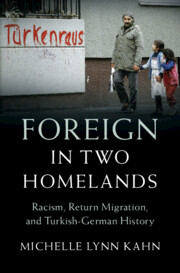My name is foreigner.
I work here,
I know how hard I work.
Do the Germans know it too?
My work is difficult,
My work is dirty.
I don’t like it, I say.
If you don’t like the work,
Go back to your homeland, they say.
…
But the blame doesn’t lie with the Germans,
Nor with the Turks.
Turkey needs remittances,
Germany needs workers.
My country sold us to Germany,
Like stepchildren,
Like useless people.
But they still need remittances.
…
My name is foreigner.
The foreign land to which we sold our labor,
In which our sweat dripped onto machines,
In which we earned riches upon riches,
Is now telling us to go back.
…
The babies we birthed in the foreign land grew up
And we handed them over to schools.
Their language is not our language.
They don’t know “Merhaba,” they say “Guten Tag.”
…
I go on vacation once per year,
Treading on the roads of Bulgaria and Yugoslavia,
Longing for Edirne and Ardahan.
My dear homeland calls us “Almancı.”
1 These lyrics and subsequent quotations (unless otherwise indicated) have been translated from the Turkish or German by the author. Republished with permission.
2 Republished with permission.

